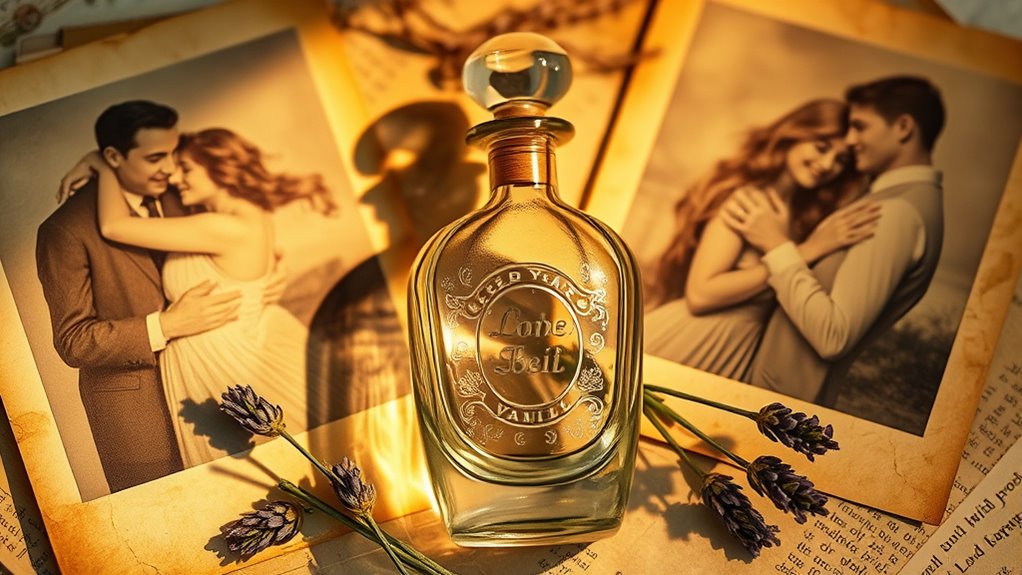Scents can instantly bring back memories of past lovers because they’re directly linked to your brain’s emotional centers through the olfactory system. Whenever you encounter a familiar smell—like perfume or a specific flower—it triggers vivid emotional responses such as longing or nostalgia. These memories are often more intense than sight or sound because scent bypasses conscious thought and connects deeply with your feelings. If you want to understand why scents hold this power over you, continue exploring.
Key Takeaways
- Scents are linked to emotional memories through the brain’s limbic system, creating strong associations with past lovers.
- Familiar fragrances act as cues that can instantly evoke feelings of love, longing, or nostalgia.
- Olfactory pathways bypass conscious thought, triggering vivid, visceral emotional reactions related to past relationships.
- Specific scents, like perfumes or shared smells, serve as powerful reminders of romantic moments.
- The deep neural connection makes scent-triggered memories more intense and emotionally impactful than other senses.

Many people find that certain smells can instantly transport them back to moments shared with past lovers, revealing how powerful olfactory memory truly is. This phenomenon hinges on the deep connection between scent association and emotional recall. When you encounter a familiar fragrance—a particular perfume, a specific flower, or even a scent from a favorite restaurant—it can suddenly flood your mind with vivid memories and feelings. This is no coincidence; your brain has linked that scent to emotional experiences, creating a direct pathway to the past. The olfactory system is uniquely wired, closely connected to the limbic system, the brain’s emotional hub. That’s why smells tend to evoke such strong, visceral reactions.
Familiar scents evoke vivid memories by connecting directly to the brain’s emotional centers.
When you associate a particular scent with a lover, every whiff can trigger a flood of emotions—love, longing, nostalgia, even sadness. These feelings aren’t just fleeting; they’re rooted in scent association, where the smell becomes a cue that disclose a specific emotional memory. For example, catching a whiff of a certain cologne might immediately remind you of a romantic evening, the way your partner’s hand felt in yours, or the sound of their laughter. This emotional recall isn’t superficial; it’s a vivid re-experience that can make you feel as if you’re reliving those moments all over again. The power of olfactory memory lies in its ability to bypass conscious thought, diving straight into your emotional core. Additionally, sensory pathways ensure that these associations are deeply ingrained and readily accessible.
You might notice that these scent-triggered memories are often more intense than visual or auditory ones. That’s because smell directly connects to the brain’s emotional centers, making scent association a potent tool for recalling feelings from the past. It’s no wonder that certain perfumes or smells can cause your heart to race or bring tears to your eyes. These reactions are rooted in a complex web of subconscious associations that your brain has formed over time. When you encounter these familiar scents, your mind automatically pulls up a tapestry of memories, making the experience deeply personal and emotionally charged.
Understanding the link between scent association and emotional recall can also help you appreciate how scents influence your mood and feelings. It’s not just about remembering past lovers; it’s about recognizing how your senses shape your emotional landscape. Whether you’re seeking comfort or longing for a lost love, the scents that trigger these memories serve as a reminder of how intricately your emotions and olfactory experiences are intertwined.
Frequently Asked Questions
Can Scents Trigger False Memories About Past Relationships?
Scents can indeed trigger false memories about past relationships due to scent distortion and false memory formation. When you encounter a familiar smell, your brain may fill in gaps with inaccurate details, leading you to recall events or emotions that didn’t happen. This process shows how powerful scent cues are in shaping your memories, but it also highlights their potential to create misleading or distorted recollections.
How Long Does Olfactory Memory Typically Last?
Olfactory persistence varies, but scent longevity can last from minutes to years, depending on the scent and individual factors. You might notice some smells fade quickly, while others linger, triggering memories long after. This strong scent retention is due to the brain’s close connection between smell and emotion centers. So, your olfactory memory can be surprisingly resilient, often lasting longer than other types of memory, and easily rekindling emotions or memories.
Are Some Scents More Likely to Evoke Emotional Responses?
Some scents are more likely to evoke emotional responses because they have strong fragrant associations and scent symbolism. When you encounter familiar fragrances, your brain links them to past experiences or feelings, making your reactions more intense. For example, a certain floral aroma might remind you of a loved one, triggering happiness or nostalgia. These powerful connections explain why some scents naturally evoke deep emotions and memories.
Can Scent Therapy Help in Healing Heartbreak?
You might wonder if scent healing can help with heartbreak. While it’s not a cure-all, scent therapy can promote emotional renewal by calming your mind and reducing stress. Using soothing aromas like lavender or chamomile, you can create a calming environment that supports healing. Incorporating scent healing into your routine may help you process emotions more gently, giving you a comforting sense of emotional renewal during tough times.
Does Olfactory Memory Differ Across Cultures?
Imagine scents as threads weaving through diverse cultural tapestries. You’ll find that cross-cultural scent associations and olfactory perception differences shape how aromas evoke emotions worldwide. These variations mean that a fragrance may feel comforting in one culture but unfamiliar or even unsettling in another. Your sense of smell is deeply rooted in cultural experiences, making olfactory memory a vibrant mosaic of personal and collective stories.
Conclusion
As you breathe in that familiar scent, memories of past lovers rush in like a whirlwind, vivid and impossible to ignore. The fragrance, a gentle whisper of the past, stirs emotions long buried beneath daily life. In that fleeting moment, you realize scent acts as both a bridge and a barrier—connecting you to love’s sweet moments, yet reminding you of love lost. It’s a bittersweet dance, where scent and memory intertwine, forever shaping your heart’s quiet landscape.










